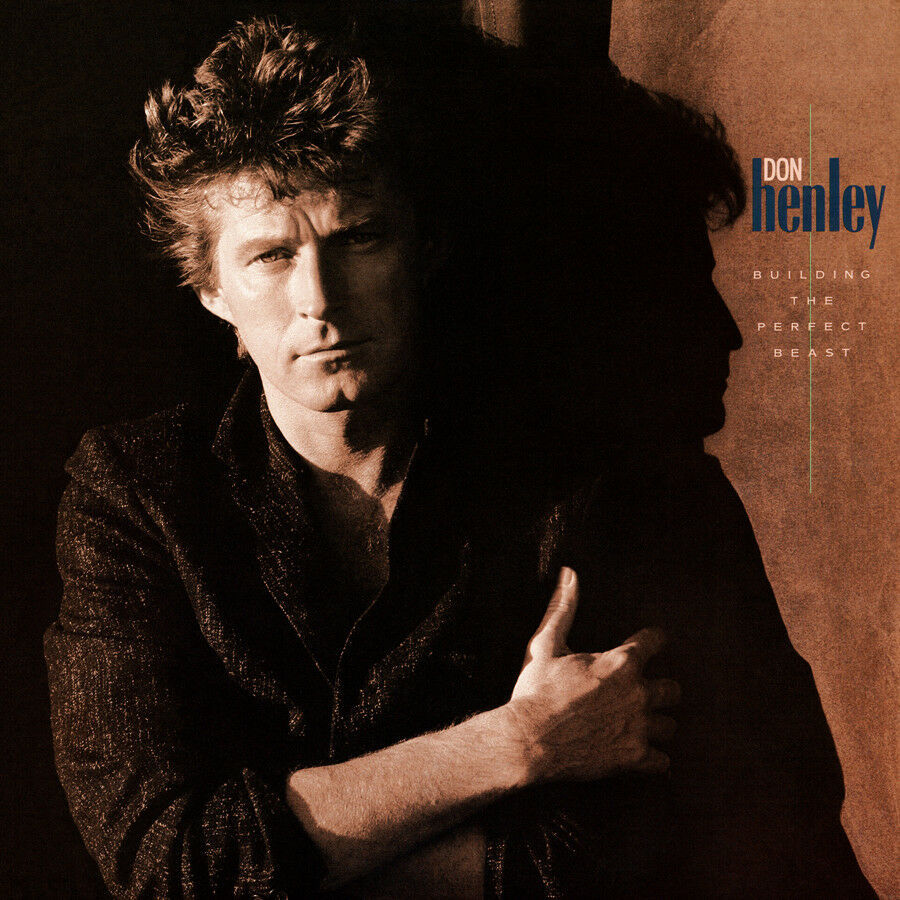 Onstage with the Eagles for a political fundraiser on July 31, 1980, in Long Beach, California, Glenn Frey and Don Felder were both ready for a post-show brawl. As Joe Walsh tuned up for “Rocky Mountain Way,” Frey remembers Felder yelling, “Only three more songs until I kick your ass, pal.” In Heaven & Hell: My Life in the Eagles,” Felder wrote that during “Best of My Love” Frey said, “F**k you. I’m gonna kick your ass when we get off stage.”
Onstage with the Eagles for a political fundraiser on July 31, 1980, in Long Beach, California, Glenn Frey and Don Felder were both ready for a post-show brawl. As Joe Walsh tuned up for “Rocky Mountain Way,” Frey remembers Felder yelling, “Only three more songs until I kick your ass, pal.” In Heaven & Hell: My Life in the Eagles,” Felder wrote that during “Best of My Love” Frey said, “F**k you. I’m gonna kick your ass when we get off stage.”
There were no actual fisticuffs that night, but after years of infighting the Eagles fell apart without physical violence. To finish off their contract with Elektra/Asylum Records, they completed editing the Eagles Live album split into Los Angeles and Miami camps, “fixing three-part harmonies courtesy of Federal Express,” in the words of producer Bill Szymczyk. When a journalist asked if they might play together again someday, drummer-vocalist Don Henley replied, “When hell freezes over.”
It took 14 years for the band to re-form The Long Run lineup (Henley, Felder, Frey, Walsh and Timothy B. Schmit), announcing their return with another live album, Hell Freezes Over. But the artistic and economic balance of the band had been altered during the hiatus, as they each pursued solo projects with varying degrees of success. Walsh’s mid-’80s LPs got some notice, but those of Felder and Schmit bombed. Frey had a series of hit singles, including “The Heat Is On” and “You Belong to the City,” and became a decent concert draw on his own.
But it was Don Henley, the drummer who could also compose and sing in top form, who parlayed the solid success of his solo debut I Can’t Stand Still (with the #3 single “Dirty Laundry”), and his duet with Stevie Nicks on her pop hit “Leather and Lace,” into the multi-platinum-selling Building the Perfect Beast. Released by Geffen Records on November 19, 1984, to huge sales and critical acclaim, the album yielded four hit singles, making him even more ubiquitous on AM and FM radio dials, as his lead vocals on Eagles songs like “Hotel California,” “Life In the Fast Lane,” “Desperado,” “One of These Nights,” etc., continued to dominate the airwaves.
Throughout his career, Henley had proven himself a willing collaborator with a variety of musicians and songwriters, and Building the Perfect Beast draws on a large crew, including Randy Newman, Toto’s David Paich and Steve Porcaro (keyboards), Fleetwood Mac’s Lindsey Buckingham (guitar/vocals), and singers from the worlds of country-rock, R&B and new wave (including J.D. Souther, Carla Olson, Belinda Carlisle, Martha Davis and Sam Moore). Mike Campbell, Benmont Tench and Stan Lynch from Tom Petty’s Heartbreakers played on and co-write songs.
Most importantly, jack-of-all-trades Danny “Kootch” Kortchmar plays a dozen instruments, co-produces with Henley and his ace engineer Greg Ladanyi, and had a hand in writing nine of the album’s 11 tracks. As Henley’s long-time friend, Kortchmar was often able to trigger Henley’s lyrics with a melody fragment or rhythmic feel. Henley told writer Bud Scoppa in 1986, “Kootch calls me ‘C-man,’ for ‘concept man.’ I listen to a track and it gives me an idea of what it sounds like, what it’s going to be about. It dictates to me certain subjects that I can put with it that will work.”
Related: We talked to “Kootch” about working with Henley, Carole King, James Taylor and others
The album is a potpourri of styles, in essence offering something for everyone without settling on a consistent tone. Aside from Kootch’s ever-agile guitars, the instrumental sound is most dominated by the synthesizers that were ubiquitous in slick mid-’80s productions. The producers, along with engineer/mixer Niko Bolas, manage to find a balance between well-rehearsed arrangements, planned overdubs, and individual spontaneity.
As Henley tells it, the opening track, “The Boys of Summer,” “was one of those great, rare moments where I got so inspired by the track that Mike Campbell had given me that it just sort of wrote itself. It came just screaming out of me. And I was jumping up and down in the car ’cause I knew I had something there.” Campbell developed a wordless demo while working on Petty’s Southern Accents sessions, and connected with Henley through producer Jimmie Iovine, who knew Henley was looking for material, when Petty didn’t think the song would fit into his new album.
The title echoes the broken hearts in Roger Kahn’s book about the Brooklyn Dodgers (and the 1939 Dylan Thomas poem “I See The Boys of Summer” Kahn borrowed), with Henley’s lyrics a plea to repair a lost love: “I can see you/your brown skin shining in the sun…I can tell you my love for you will be strong/After the boys of summer have gone.” The dense recording is chock-full of brilliant instrumental effects. Kortchmar, Porcaro and Campbell play synthesizers, Larry Klein bass, and although Campbell adds guitar and percussion there’s no actual drum kit on the track. Henley designed the track specifically for his slightly-rasping tenor: “I learned in the Eagles, from way back, that putting a song in the right key is very important. You have to get it up high enough so that it has a sense of urgency, so that your voice cuts through.” In fact, “The Boys of Summer” was near completion when Henley scrapped it, insisting it be re-recorded a half-step higher.
Henley has received flack for singing “Out on the road today/I saw a Deadhead sticker on a Cadillac/A little voice inside my head said /‘Don’t look back.’” He says he did indeed see such a bumper sticker on “the status symbol of the right-wing upper-middle-class American bourgeoise,” and connected what he saw as a lamentable “sell-out” to the song’s protagonist, who can’t accept he’ll never get his girl back. Whether the juxtaposition works for or against the song’s theme can be debated, but it’s certainly remained one of Henley’s most vivid images.
Related: The making of Eagles’ Hotel California
With Lindsey Buckingham’s guitars and backing vocal, “You Can’t Make Love” shares a sonic signature with mid-’80s Fleetwood Mac, but the song itself, by Kootch and Henley, is decidedly minor, with a flat melody and shopworn lyrics that rely on a repeated pun on “make”: “You can go through the motions with your magic spells/Buy all the potions that Fifth Avenue sells/You can try to call down all the stars above/But you can’t make love.”
“Man With a Mission” is a Chuck Berry-style rocker which adds Charlie Sexton on guitar and sounds like it belongs on a different album. Henley’s vocal is downright shrill, and why it took three writers to turn out such a standard chord pattern and lyrics is anybody’s guess (“I see these women at the car wash/Women at the mall/Little-bitty women and women who are tall”).
Thankfully, after two clunkers things pick up. “You’re Not Drinking Enough” is a Kortchmar original that begins in epic mode, with acoustic piano (Paich), synth, organ and electric guitar announcing this will be a full Roy-Orbison-via-Eagles melodrama. Henley sings the hell out of it, rising into falsetto early on. It’s really a country song decked out in synths instead of rhinestones, the kind of thing that appeals to the small-town Texan still alive inside Henley. Kootch echoes Merle Haggard: “You’re not drinking enough to wash away old memories/And there ain’t enough whiskey in Texas/To keep you from begging ‘please.’”
Henley-Kortchmar-Tench provide “Not Enough Love In the World.” Tim Drummond is on bass and Tench on keyboards, while Henley handles some additional keyboards and percussion. Henley is an expert at delivering lovelorn sentiment, and this performance delivers in spades: “I was either standing in your shadow/Or blocking your light/Though I kept on trying/I could not make it right/For you girl/There’s just not enough love in the world.”
The album’s title track has a bunch of background vocals and “chant voices,” African drums, a synclavier (played by Bee Gees associate Albhy Gaulten), multiple synthesizers and generally manages to sound kind of silly as Henley delivers weak social commentary: “Ever since we crawled out of the ocean and stood upright on land/There are some things that we just don’t understand.” The overuse of synthesizers is pure 1984, in a bad way.
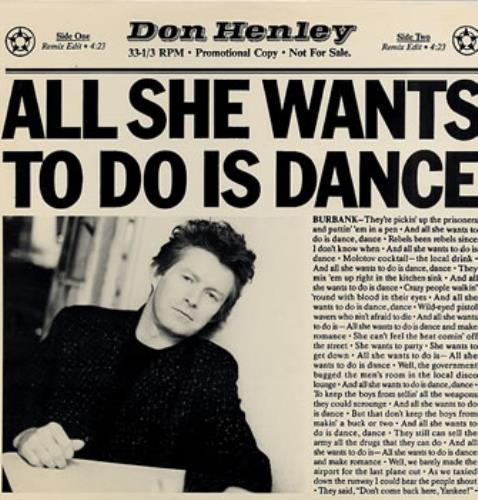 Fortunately, the synthesizers that power Kortchmar’s solo composition “All She Wants To Do is Dance” fit in better, because the song is meant to sound like a piece of fluff that can fill a dancefloor. Background vocals from the Motels’ Martha Davis and Scandal’s Patty Smyth help put over the irony of lyrics trashing an airhead party girl who’s apparently living in a war zone without noticing it, while musically the relentless beat of the track panders to the same demographic: “Molotov cocktail, the local drink/All she wants to do is dance, dance/They mix ’em up right in the kitchen sink/And all she wants to do is dance.”
Fortunately, the synthesizers that power Kortchmar’s solo composition “All She Wants To Do is Dance” fit in better, because the song is meant to sound like a piece of fluff that can fill a dancefloor. Background vocals from the Motels’ Martha Davis and Scandal’s Patty Smyth help put over the irony of lyrics trashing an airhead party girl who’s apparently living in a war zone without noticing it, while musically the relentless beat of the track panders to the same demographic: “Molotov cocktail, the local drink/All she wants to do is dance, dance/They mix ’em up right in the kitchen sink/And all she wants to do is dance.”
As a single, “All She Wants To Do is Dance” followed the cerebral “The Boys of Summer” into Billboard’s top 10.
“A Month of Sundays,” the only song Henley wrote for the album on his own, is a heartfelt ballad that could have found a home on any Eagles album. It was on the CD and cassette versions of the album, but was unfortunately left off the vinyl LP and used as a single B-side instead. The lyrics combine Mellencamp and Sandburg: “I used to work for Harvester/I used to use my hands/I used to make the tractors and the combines that plowed and harvested this great land.” Randy Newman (who Henley considered “the best songwriter in America” and a big influence on his own writing) arranges the synthesizers and provides the cinematic glow. Henley contributes some apt drumming, which blends into the longest and most ambitious track on the disc, “Sunset Grill.”
“Sunset Grill” is a real work of art, often overlooked in surveys of Henley’s greatest moments. With a huge ensemble, it has everything clicking, from Pino Palladino’s fantastic bass work to Michael Boddicker’s E-mu Emulator and the overall synth/keyboard arrangements he co-creates with Newman, Tench and Kootch. Paich’s acoustic piano solo is great, and the horn section arranged by Jerry Hey is woven in beautifully. Observing urban life from the safety of a neighborhood burger joint, the protagonist knows something’s wrong, but delays doing anything about it, concluding, “Maybe we’ll leave come springtime/Meanwhile, have another beer.”
“Drivin’ With Your Eyes Closed” is a Lynch-Kortchmar-Henley co-write, and sounds too much like “Life In the Fast Lane” without adding anything much except fine Kootch guitar soloing. The concluding “Land of the Living” starts off with more than a hint of the Doobie Brothers’ “What a Fool Believes,” but thankfully builds its own pop bona fides with the help of Bill Cuomo (synthesizer and percussion), Palladino’s slithery bass and breezy harmony vocals from Smyth and Henley. It ends the album with an optimistic, light tone that is quite different from the way it begins.
The success of Building The Perfect Beast meant Henley traded his relative anonymity with the Eagles for big-budget MTV videos and magazine covers. “The whole rock-musician-as-outlaw thing seems pretty immature and hokey to me now,” he told Scoppa. “I’m basically a shy person. I’m not your Mr. Showbusiness lead-vocalist type of guy.” Nonetheless, with his follow-up smash The End of the Innocence and the continuing viability of the Eagles (still touring with a revised lineup after the death of Frey in 2016), he’s a major star, however reluctant.
Retirement doesn’t seem to be on his agenda, although he told the London Telegraph in 2019, “I’ve got nerve damage in the left arm and shoulder from 55 years of repetitive motion, pounding the snare drum. I’ve got hearing loss. There will come a time, no matter what your heart and mind wants, when your body says you’ve got to stop…But I need to work. You get the energy from the crowd. And at the end, when the people are standing and cheering, that’s when the sense of wonder and gratitude flows.”
[The album received a 40th anniversary vinyl edition in 2024, remastered from the original analog tapes and pressed on 180-gram vinyl. It’s available as a 2-LP set for the first time and can be ordered in the U.S./worldwide here, in Canada here and in the U.K. here.]
Watch Henley perform “The Boys of Summer” live on The Howard Stern Show in 2015

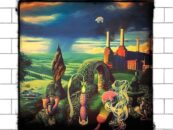

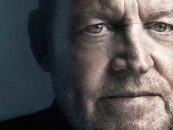
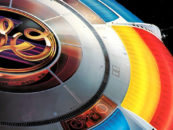

4 Comments so far
Jump into a conversationDon Henley is a complex, sometimes irritating man (and his long-time feud with Don Felder is just silly; he needs to let that one go)–but boy howdy, can he ever sing! What a voice he has! As soon as he opens his mouth to sing, you know who it is. He’s that good. Glen Frey used to call Henley the Eagles’ “secret weapon,” and no wonder.
Love the article. But I’m gonna completely disagree with the commentary on the title track. I love “Building the perfect beast” — with that unusual time signature and propulsive rhythm. It’s a legitimately fun track and one of my favorites on an overall excellent album.
I disagree on the title track Building the Perfect Beast. Its sheer 80’s techno pop/rock brilliance. I think the bias is aiming unnecessarily towards the tech use. That track is bold, majestic and brilliant song writing well executed with the instrumentation NOT a trad rock song in the least. Nostalgia take me away…great review overall!
Not a fan of Don Henley’s overbearance of the Eagles’s early 1980’s direction (and ultimate break-up), but (IMO) “Building The Perfect Beast” is a masterpiece, and one of the most listenable albums of all-time, in the Rock genre.
“End of The Innocence,” was equally crafted, but more cerebral and self-reflective, to this listener.
Another winner.